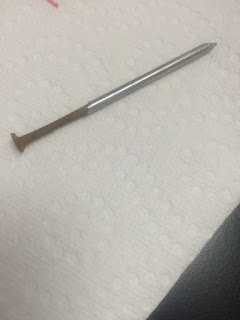In this lab, we placed an iron nail in Copper(II) Chloride and used stoichiometry to determine whether Iron(II) Chloride or Iron(III) Chloride formed. I liked this lab because it helped me understand percent yield and how it relates to the theoretical yield. In the end, we had Iron(II) Chloride when comparing the percent yields.
Monday, December 14, 2015
Sunday, December 13, 2015
Percent Yield
Usually, the amount of product actually produced in a reaction is less than the theoretical yield. To find the efficiency of a reaction, you can get a percent yield by comparing actual yield and theoretical yield. Percent yield is the actual yield divided by the theoretical yield of a reaction multiplied by 100. Percent yield is pretty easy once you do some practice problems.
Helpful links
https://www.boundless.com/chemistry/textbooks/boundless-chemistry-textbook/mass-relationships-and-chemical-equations-3/reaction-stoichiometry-44/calculating-theoretical-and-percent-yield-234-4704/
https://www.khanacademy.org/science/chemistry/chemical-reactions-stoichiome/limiting-reagent-stoichiometry/a/limiting-reagents-and-percent-yield
Helpful links
https://www.boundless.com/chemistry/textbooks/boundless-chemistry-textbook/mass-relationships-and-chemical-equations-3/reaction-stoichiometry-44/calculating-theoretical-and-percent-yield-234-4704/
https://www.khanacademy.org/science/chemistry/chemical-reactions-stoichiome/limiting-reagent-stoichiometry/a/limiting-reagents-and-percent-yield
Thursday, December 10, 2015
Foundations of Stoichiometry
In this unit, we have learned how to use a balanced chemical equation and some given information to predict an amount of reactant or product. By picking out the given and end goal, you can compare then moles of each substance using coefficients from the balanced equation to get a theoretical answer. You can also use stoichiometry to find limiting reagents by looking at which reactant produces the least amount of product in a reaction.
Helpful links
http://chemwiki.ucdavis.edu/Analytical_Chemistry/Chemical_Reactions/Stoichiometry_and_Balancing_Reactions
https://www.khanacademy.org/science/chemistry/chemical-reactions-stoichiome/stoichiometry-ideal/v/stoichiometry
http://www.chemteam.info/Stoichiometry/What-is-Stoichiometry.html
 |
| www.tes.com |
Wednesday, December 9, 2015
Stoichiometry Quiz
After taking the quiz yesterday, I felt like I did pretty well on it. Stoichiometry is easy to understand once you know your end goal and memorize the road map. As long as you also have a grasp on the material from other units like predicting the products of chemical reactions, you will not stress out over this unit. The notes and practice tests in this unit have also helped me a lot since stoichiometry becomes much more comfortable after a few practice problems.
Helpful links
Friday, December 4, 2015
Post Test Reflection
I would say that the exam went pretty well for me. There were a few harder questions, but the overall test was pretty straightforward. I feel like I did well because of the practice tests on schoology. They really helped me prepare for the exam. I will do the same for the next unit!
Wednesday, December 2, 2015
Metals Lab
Yesterday we did a lab that had us mix various metals and solutions to see if they reacted or not. Some combinations didn't react at all while others reacted more violently. I enjoyed this lab because it helped me understand how a reactivity series works and the popping reactions that produced smoke were interesting.
Helpful links
http://www.chemteam.info/Nomenclature/Acid-Nomenclature.
http://preparatorychemistry.com/Bishop_Precipitation_Equations.htm
Helpful links
http://www.chemteam.info/Nomenclature/Acid-Nomenclature.
http://preparatorychemistry.com/Bishop_Precipitation_Equations.htm
 |
| Some results |
Chemical Reactions
The three main types of reactions in this unit are double replacement, acid/base, and redox.
In a double replacement reaction, the positive ions replace each other and a solid is formed. Memorize your solubility rules for these reactions to determine which product is the solid.
I an acid/base reaction, the driving force is water while it also produces a salt. Strong acids and bases dissociate while weak ones do not.
In a redox reaction, the driving force is the transfer of electrons. A species that loses electrons is oxidized while one that gains electrons is reduced.
Helpful links
http://chemwiki.ucdavis.edu/Analytical_Chemistry/Electrochemistry/Redox_Chemistry/Oxidation-Reduction_Reactions
http://www.shodor.org/unchem/advanced/redox/
In a double replacement reaction, the positive ions replace each other and a solid is formed. Memorize your solubility rules for these reactions to determine which product is the solid.
I an acid/base reaction, the driving force is water while it also produces a salt. Strong acids and bases dissociate while weak ones do not.
In a redox reaction, the driving force is the transfer of electrons. A species that loses electrons is oxidized while one that gains electrons is reduced.
Helpful links
http://chemwiki.ucdavis.edu/Analytical_Chemistry/Electrochemistry/Redox_Chemistry/Oxidation-Reduction_Reactions
http://www.shodor.org/unchem/advanced/redox/
Subscribe to:
Comments (Atom)






